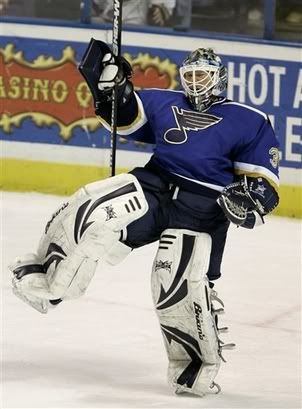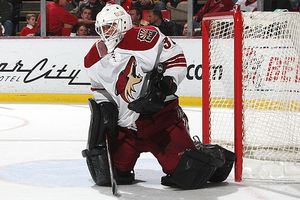
Winnipeg Years — WHA and NHL
The team began play as the Winnipeg Jets, one of the founding franchises in the World Hockey Association (WHA). The Jets were the most successful team in the short-lived WHA, winning three Avco World Trophies, the league's championship trophy, and making the finals five out of the WHA's seven seasons. It then became one of the four teams admitted to the NHL when the rival leagues merged in 1979.
However, the club was never able to translate that success into the NHL after the merger, in part because it played in the same division as the powerful Calgary Flames and Edmonton Oilers. While the Jets made the playoffs 11 times in 17 seasons, they only won two playoff series. Because of the way the playoffs were structured for much of their Winnipeg run, they were all but assured of having to defeat either the Oilers or the Flames to reach the Conference Finals.
The Jets ran into financial trouble when player salaries began spiraling up in the 1990s; this hit the Canadian teams particularly ehard. Winnipeg was the second-smallest market in the NHL for most of the Jets' existence, and after the Quebec Nordiques moved to Denver in 1995 (becoming the Colorado Avalanche), it became the smallest market. In addition, the Jets' home arena, Winnipeg Arena, was one of the smallest in the league. Despite strong fan support, several attempts to keep the team in Winnipeg ultimately fell through. In the spring of 1996, Phoenix businessmen Steven Gluckstern and Richard Burke along with a local investor group bought the team with plans to move it to Phoenix for the 1996–97 season. A name-the-team contest yielded the nickname "Coyotes."
The early Phoenix years (1996–2005)
In the summer that the move took place, the franchise saw the exit of Jets stars like Teemu Selanne and Alexei Zhamnov, while the team added established superstar Jeremy Roenick from the Chicago Blackhawks. Roenick teamed up with power wingers Keith Tkachuk and Rick Tocchet to form a dynamic 1–2–3 offensive punch that led the Coyotes through their first years in Arizona. Also impressive were young players like Shane Doan (as of the current season the last remaining Coyote dating to the team's days in Winnipeg), Oleg Tverdovsky, and goaltender Nikolai Khabibulin, whom the fans nicknamed the "Bulin Wall."
Another key addition to the squad was fleet sniper Mike Gartner, who had come over from the Toronto Maple Leafs. Despite his speed, and scoring his 700th career goal on December 15, 1997, Gartner battled injuries as 1997 became 1998, and the Coyotes did not renew his contract. He retired at the end of the season.
After arriving in Phoenix, the team posted six consecutive .500 or better seasons, making the playoffs in every year but one. They were tremendously popular, in part because of the large number of Northern expatriates in the Phoenix area. The one year they missed the playoffs, the Coyotes became the first team in NHL history to post 90 points — long the standard of excellence in the NHL — and yet still miss the post-season.
However, the Coyotes' home during their first eight years in Phoenix, America West Arena, was completely inadequate for hockey. Although it was considered a state-of-the-art facility (it was built in 1992), the arena's floor was just barely large enough to fit a hockey rink. In several locations, the nets could not be seen. As a result, listed capacity had to be cut down to just over 16,000 — the second-smallest in the league at the time — after the first season. Even then, a stretch of the upper deck actually hung over the boards, obstructing the views of around 3,000 spectators. Some fans even claimed that they saw places where the original concrete had been sheared off to create retractable seats for hockey.
Burke bought out Gluckstern in 1998, but was unable to attract more investors to alleviate the team's financial woes (see below). Finally, in 2001, Burke sold the team to Phoenix-area developer Steve Ellman, with Wayne Gretzky as a part-owner and head of hockey operations. Ellman has since sold controlling interest to trucking company executive Jerry Moyes, who is also a part-owner of the Arizona Diamondbacks.
To this day, however, the Coyotes have never made it out of the first round of the playoffs. The franchise has not won a playoff series since 1987, when it was still in Winnipeg. The closest that they came to advancing past the first round was during the 1999 playoffs, when they lost a heartbreaking Game 7 to the St. Louis Blues. In 2002, the Coyotes posted 95 points, one point behind their best total as an NHL team, but made a rather meek first-round exit from the playoffs, being eliminated in five games by the San Jose Sharks.
However, since then the Coyotes have been barely competitive. Aside from the 2005–06 season, the team hasn't broken the 80–point barrier. Attendance levels dropped considerably, worrying many league executives. In addition, an unfavorable lease with the city of Phoenix (owner of America West Arena) had the team bleeding red ink; [1] the Coyotes have never really recovered from the resulting financial problems.
In 2003, the team opened Glendale Arena (now known as Jobing.com Arena), and moved there in 2003. Ellman had committed to building the new arena after numerous proposals to improve the hockey sight lines in America West Arena came to nothing. Simultaneously, the team changed its logo and uniforms, moving from the previous multi-colored kit to a more streamlined look.
Gretzky Era (2005 – present)
On 6 August 2005, Brett Hull, son of former Jet Bobby Hull, was signed and assigned the elder Hull's retired # 9. Two days later, Gretzky named himself head coach, replacing Rick Bowness, despite the fact that he had never coached at any level of hockey. The Coyotes Ring of Honor was unveiled on 8 October, inducting Gretzky and Bobby Hull. One week later, Brett Hull announced his retirement. On 21 January 2006, Jets great Thomas Steen was the third inductee to the Ring of Honor. On 13 April, Steve Ellman announced an agreement for Jerry Moyes to assume majority ownership control of the Coyotes, Glendale Arena and the National Lacrosse League's Arizona Sting. Also in the 2005–06 season, the Coyotes were planning to host the NHL All-Star Game, which was canceled because of the 2006 Winter Olympics.
The team returned to Winnipeg on 17 September, 2006 to play a pre-season game against the Edmonton Oilers, but were shut-out 5–0 before a sellout crowd of 15,015.
On 11 April 2007, CEO Jeff Shumway announced that general manager Michael Barnett (Gretzky's agent for over 20 years), senior executive vice president of hockey operations Cliff Fletcher, and San Antonio Rampage's general manager and Coyotes' assistant general manager Laurence Gilman "have been relieved of their duties." The Coyotes finished the 2006–2007 season 31–46–5, its worst record since relocating to Phoenix. [2]
On May 29, 2007, Jeff Shumway announced that Don Maloney had agreed to a multi-year contract to become General Manager of the Coyotes. As per club policy, terms of the contract were not disclosed. [3] However, as has been the case with all general managers since 2001, Maloney serves in an advisory role to Gretzky.
The 2007–08 season has been something of a resurgence for the Phoenix Coyotes. After their disastrous 2006–07 campaign, the Coyotes looked to rebuild the team by relying on their drafted talent such as Peter Mueller and Martin Hanzal to make the team successful as opposed to using free agency. The Coyotes also acquired Radim Vrbata from the Chicago Blackhawks for Kevyn Adams in an effort to provide the team with more offense. The team signed both Alex Auld and David Aebischer to compete for the starting goaltender position with Mikael Tellqvist acting as the backup goaltender. Neither Auld or Aebischer were able to hold on to the starting position, leaving the Coyotes to turn to the waiver wire for assistance. On 17 November 2007, the Coyotes were able to claim Ilya Bryzgalov off waivers from the Anaheim Ducks. Bryzgalov responded by not only starting in goal the day he was acquired, but posing a shutout in his Coyotes debut against the Los Angeles Kings. Bryzgalov was soon given a 3–year contract extension because of his high level of play. Despite predictions of another disastrous season, the Coyotes played competitive hockey for most of the season. However, they finished eight points short of the last playoff spot, with 83 points.
Because of the recent failures owner Jerry Moyes has fired head coach and co-owner Wayne Gretzky as well as GM Don Maloney and Maloney's assistant's. The roles are expected to be filed like this:
Head Coach: Jeff Shannon

(Jeff on Canucks) Jeff has played on the Caps Sens Wings and Nucks he played his best on the Canucks but put up good numbers on others
GM: Jason Skyland:

who had played on the penguins the Senators and the Wings and was a legend.
Assistant GM either:Nick Barry

who had a stint
with the Sabres.
and/or Graham Morrison

who had a 4 year stint
with the canucks.
The News of who will sign will be announced later today.
thank you Wikipedia for supplying the Background Information


















Comment